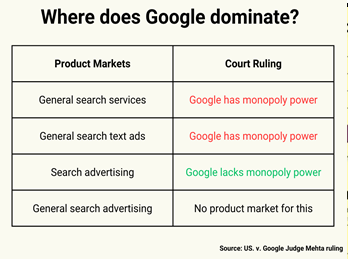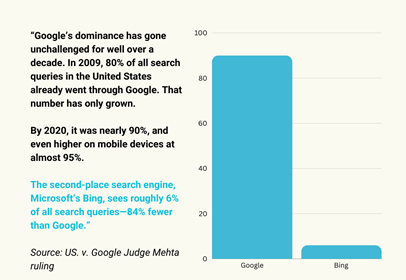WHAT IS THE GOOGLE ‘MONOPOLY’ ANTITRUST CASE AND HOW DOES IT AFFECT CONSUMERS?
Relevance: GS – 3 – Indian Economy and issues relating to planning, mobilization, of resources, growth, development and employment; Awareness in the fields of IT
Why in the news?
- Google on August 5, 2024 lost a significant antitrust case filed by the S. Department of Justice, which focused on the company’s dominance in the search engine market and its expensive partnerships to push its product.
- The case involved a 10-week-long bench trial starting in September 2023, where top tech leaders like Google CEO Sundar Pichai and Microsoft CEO Satya Nadella
About the news
- The lawsuit accused Google of using its dominant position in the web search and advertising sectors to eliminate competition and maintain its monopoly.
- The court reviewed Google’s exclusive deals with handset makers as evidence of its anti-competitive behavior.
- S. District Judge Amit Mehta ultimately ruled that Google was indeed a monopolist.
Findings in Google Antitrust Case
Exclusive Distribution Strategy:
- The ruling highlighted that Google’s search dominance was largely achieved through exclusive distribution agreements or default distribution.
- Google secured contracts with browser developers, mobile device manufacturers, and wireless carriers to make its search engine the default option for users, paying over $26 billion for this privilege in 2021 alone.
Monopoly Markets:
- Google was found to have used its monopoly power in two specific markets: general search services and general search text ads.
- The court noted that Google charged supra-competitive prices for search text ads, enabling it to earn monopoly profits.
- The court concluded that Google is a monopolist and has acted to maintain its monopoly, violating Section 2 of the Sherman Act. This U.S. law prohibits business monopolies and attempts to monopolize markets.
Evidence Handling:
- The court criticized Google for failing to preserve employee correspondence that could have served as evidence. Despite this, the company was not sanctioned for this lapse, though the court warned that it might face consequences in future cases.
Favorable Findings for Google:
- The court found that Google did not have monopoly power in the search advertising market and noted that there was no specific product market for general search advertising. Additionally, Google was not held liable for actions involving its advertising platform.
Acknowledgment of Search Engine Quality:
- The judge recognized that Google had developed the “industry’s highest quality search engine,” earning the trust of hundreds of millions of daily users.
Impact of Monopolistic Practices on Consumer Experience
- Reduced Competition: When a monopoly forms, competitors may be forced out of the market, leading to fewer choices for consumers. This concentration of power in a single company limits options and stifles innovation in the market.
- Abuse of Power: A monopolistic company can exploit its dominant position by imposing unfavorable terms on consumers, as they have limited alternatives. This can lead to higher prices, lower quality, and reduced customer service.
- Lack of Incentive for Improvement: Monopolies often lose the motivation to improve their products or services, as there is no competitive pressure. This can result in stagnation, where the company no longer strives to enhance the quality of its offerings.
- Indifference to Consumer Needs: The Google case highlighted that a monopolistic company might not be concerned about degrading its product quality. As noted in the court ruling, Google’s internal study showed that it would not lose revenue even if it significantly reduced the quality of its search product, demonstrating a lack of concern for user satisfaction—a trait typical of a firm with monopoly power.
Way forward: Following the Ruling
- Appeal Process: Google plans to appeal the ruling, which will prolong the legal proceedings as the case moves to higher courts for further review.
- Court-Ordered Remedy Discussion: Both Google and the DOJ have been instructed by the court to negotiate and propose a remedy before their meeting with Judge Mehta on September 9. The potential remedies could include:
- Breaking Up Google: This extreme measure could drastically change the digital business landscape, as Google’s platform is crucial for interactions between individuals and businesses.
- Ending Exclusive Deals: Google might be ordered to terminate its exclusive agreements with mobile handset makers, which could lead to significant financial losses for these manufacturers. Notably, companies like Apple, which benefit from hefty payments for pre-loading Google’s search engine, may be disincentivized from developing or promoting rival search engines.
- Impact on Handset Makers: If Google is forced to end its exclusive deals, smartphone manufacturers, particularly Apple, could lose billions of dollars in revenue. During the trial, Apple indicated that it would continue to use Google as its default search engine, underscoring the financial incentives involved.
- Upcoming Antitrust Trial: In addition to this case, the DOJ is preparing to challenge Google in another antitrust trial focused on the company’s ad technology, which could further impact Google’s business practices.
Alternative articles
https://universalinstitutions.com/us-antitrust-ruling-on-googles-market-monopoly/
Mains question
Discuss the implications of monopolistic practices in the technology sector on consumer welfare, using the recent U.S. antitrust ruling against Google as a case study. (250 words)





